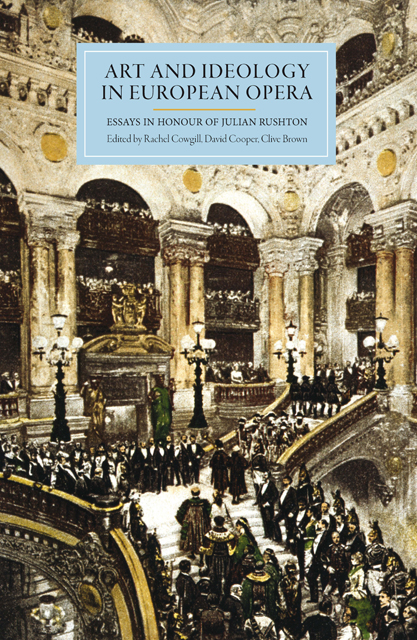Book contents
- Frontmatter
- Contents
- List of Figures
- List of Music Examples
- List of Tables
- Notes on Editors and Contributors
- Acknowledgements
- Introduction
- I Nationalism, Cosmopolitanism and National Opera
- II Opera, Class and the Politics of Enlightenment
- III Opera and Otherness
- Julian Rushton: A Family Memoir
- 7 The Works of Julian Rushton
- Index
- Tabula Gratulatoria
8 - Nobility in Mozart’s Operas
Published online by Cambridge University Press: 28 February 2023
- Frontmatter
- Contents
- List of Figures
- List of Music Examples
- List of Tables
- Notes on Editors and Contributors
- Acknowledgements
- Introduction
- I Nationalism, Cosmopolitanism and National Opera
- II Opera, Class and the Politics of Enlightenment
- III Opera and Otherness
- Julian Rushton: A Family Memoir
- 7 The Works of Julian Rushton
- Index
- Tabula Gratulatoria
Summary
In his indispensable Cambridge Opera Handbook to Mozart's Don Giovanni, Julian Rushton describes Don Ottavio as ‘admirable’ and his behaviour as ‘exemplary’. Despite his claim that Ottavio lacks an heroic aspect, Rushton is far more sympathetic to this character than most writers – or indeed, than most producers. Sympathy with, or admiration for Ottavio implies a now-rare understanding of the noble virtues, for Ottavio's character is the very epitome of Enlightened nobility. Indeed, Don Ottavio and the emperor Tito, arguably Mozart's two most admirable noblemen in the mature operas, are also the least well-understood characters in their respective works. This lack of understanding arises partly because they exemplify a set of values foreign to the modern world; but also because they epitomize the virtues of a social stratum that Mozart and Da Ponte more famously, and nowadays more comfortably, criticized or ridiculed in the figures of the Count and Don Giovanni.
Several questions arise from Mozart's deployment of both admirable and appalling noble characters. Perhaps the most obvious one concerns his attitude to the aristocracy, and the extent to which it can or should be divined from fictional works for which he did not write the text. The answer to that relies in part on a sense of how plausible or realistic the aristocratic characters and noble attitudes represented in the operas are. And, regardless of the composer's own attitude to the nobility, there is the question of how modern performers and directors might communicate something about the nature of Enlightenment nobility to an audience for which it is profoundly foreign.
So first to the question of whether Mozart's aristocrats reflect the real world of eighteenth-century nobility. One must distinguish between the seria operas, with their ancient and mythological settings, and the comic works, set more or less in the here and now, except for Die Zauberflöte and its fairy-tale miseen- scene. With this distinction in mind, then, and in brief: the treatment of the nobility in the comic works is on the whole quite plausible with respect to the physical circumstances of the characters; but the underlying structural message about their place in eighteenth-century society is somewhat less realistic.
- Type
- Chapter
- Information
- Art and Ideology in European OperaEssays in Honour of Julian Rushton, pp. 176 - 193Publisher: Boydell & BrewerPrint publication year: 2010



